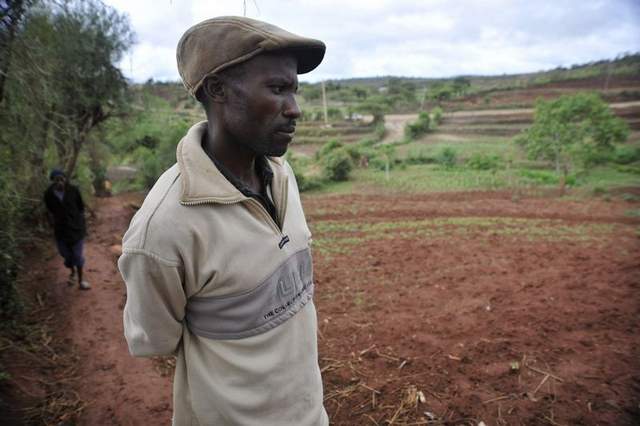
Fog shrouds the terraced hills, and a stream is swollen from the rain that fell overnight, but the damage of a drought that left 10 million Kenyans dependent on food aid is still evident. On many of the small farms, the ground is bare at a time when corn crops should be several feet tall.
"We had no maize because we planted and there was no rain," said Victor Mutua, who feeds an extended family of 15 from his 20-acre plot.
Poor small-scale farmers like Mutua are at the center of a battle over the future of global agriculture and biotechnology. Scientists are preparing to test in Kenya a genetically modified variety of corn that would be resistant to drought. The seeds are the product of a $47 million project funded largely by Microsoft co-founder Bill Gates' foundation and using technology and breeding expertise donated by U.S. seed giant Monsanto Co.
The project could have sweeping ramifications. Experts say genetically modified seeds could help boost food production, which must rise 70 percent by 2050 to feed a growing population, according to the United Nations' Food and Agriculture Organization.
According to one study, corn production in five East African nations is expected to grow about 14 percent by 2050, but demand for corn could nearly triple.
Having drought-tolerant seeds available for poor African farmers would be a huge public relations coup not only for Monsanto, but also for rivals such as Johnston-based Pioneer Hi-Bred that have struggled to sell Africa, Europe and other regions on genetically modified food.
Opposition in Europe to biotech food is so pervasive that corn grown in Iowa and elsewhere in the United States, most of which is genetically modified, is virtually shut out of the market there. Some African countries have refused donations of U.S. corn that is genetically modified.
Pioneer, a unit of DuPont, last month announced an African project similar to Monsanto's that is aimed at developing corn varieties that produce more grain on less nitrogen fertilizer. Agriculture Secretary Tom Vilsack said the projects fit into the Obama administration's strategy for increasing the use of gene-altered seeds.
The projects will help to "knock down some of the concerns that are expressed globally and domestically about biotechnology," he said. Secretary of State Hillary Clinton, in a visit to East Africa last year, said that "with Kenya's leadership in biotechnology and biosafety, we cannot only improve agriculture in Kenya, but Kenya can be a leader for the rest of Africa."
Boosting African food production also could take some political heat off U.S. farmers and biofuel producers, accused of boosting global food prices by diverting corn and soybeans into ethanol and biodiesel. Increased corn prices fall especially hard on the 300 million Africans for whom corn is a staple food.
The seeds are to be distributed free of the royalties that are typically included in the price of a bag of seed. Because of these royalties, biotech seed now sold in South Africa costs about 30 to 40 percent more than conventional varieties. Similar field trials are planned in Uganda; Tanzania, which borders Kenya; and Mozambique in southern Africa.
Some critics, however, call the African project a publicity stunt. They say African farmers' problems are too complex to be solved with high-tech seeds.
Many farmers don't have the cash and can't get credit to buy conventional hybrid seeds, let alone fertilizer or insecticides. They regularly lose some of the grain they harvest to weevils because it isn't stored properly. When rains fail completely, as they did across much of Kenya last year, even Monsanto's super seeds are unlikely to help.
But scientists and some development experts say that the biotech seeds could boost yields during shorter dry spells, or periods of moderate drought, by as much 25 percent. That would increase the average yield in Africa by eight bushels an acre. Eight bushels doesn't sound like much, but it's enough grain to feed three Kenyans for a year.
"If the climate predictions are correct, Africa's toughest days are still ahead of her. We must prepare," said Daniel Mataruka, executive director of the Africa Agricultural Technology Foundation, a group overseeing the project.
But what if the project doesn't deliver the promised results? Willem Engelbrecht, who manages Pioneer's operations in South Africa, worries about a backlash against his industry. South Africa is the only sub-Saharan country that now allows farmers to use genetically modified, or GM, seeds.
"If it really works, it will be excellent publicity for GM," he said. "If it doesn't work, it can be very bad publicity."
Marian Mayet of the South Africa-based anti-biotech African Centre for Biosafety doubts the seeds will work. "Pie in the sky," she calls the project.
Mutua doesn't know what GM seeds are but says he'd gladly try them. So would his neighbor, Joshua Maweu. "As long as it doesn't hurt my shamba," or small farm, he said. His farm is bare except for a patch of less than an acre. The field is his most fertile because it lies at the bottom of a slope and catches silt - and any extra fertilizer - that washes from the fields above.
Many farmers and ordinary Africans are suspicious of biotech crops or have little knowledge of them. Some are convinced biotech seeds are already being used - it's actually illegal to plant them - and don't want them.
"Most of the small-scale farmers are against genetically modified organisms," said Moses Shaha, a grower who leads the Kenya Small Scale Farmers Forum, which claims 5,000 members.
Stephen Klaitugi, a businessman and part-time potato farmer who was shopping at a Nairobi supermarket, thinks biotech seeds are needed but doesn't think they'll be an easy sell. "A few people who are learned will understand, but most Kenyans are not learned. They will think you will destroy them," he said.
Other major hurdles must be overcome before the corn even reaches the market.
Researchers and biotech companies face tight constraints on where they can conduct field trials, and that will make it difficult to test the seeds in the variety of soil conditions and climate conditions the crops would face.
Monsanto tested the seeds in four locations in South Africa last year, but so far has one test site potentially available in Kenya, a government research station located in an arid region between Nairobi and the Indian Ocean coast.
Developing gene-altered crops requires multiple field trials in varying sites and several years. The shortage of potential test sites points to another challenge facing the Monsanto project: Rainfall at the wrong time can wreck a field trial, setting the project back. In 2008, both of Monsanto's test sites of drought-resistant maize in South Africa were harmed by rain.
Kenya should be one of the easiest places to test: Last year, Kenya enacted a law for regulating the development and production of gene-altered crops, putting the country ahead of many other African nations in preparing the way for biotech foods.
Many small-scale farmers don't use fertilizer or insecticides, and certainly not weedkillers, because they say they can't afford them, especially after a crop failure leaves them struggling to scrape up cash just to buy seed for the next season. Many farmers fertilize their maize with manure, but last year 40 percent of the local livestock died in the drought, said Francis Kimeus, the veterinary officer at a local farm supply store.
Poor farmers commonly save grain from hybrid crops and use the kernels as seed the next season. That defeats the purpose of a hybrid, because the high-yielding trait doesn't carry over to the next season. Sales of hybrid seed were higher last year around Machakos because farmers didn't have enough grain to plant, salesmen said.
In December, area farmers who couldn't afford the hybrids - a 2-kilogram (4.4 pound) bag of Pioneer or Monsanto seed costs $4.50 to $5 - went to the shops in town that sell bulk maize, rice and beans and bought 90-kilo bags of food maize to substitute as seed.
Some critics worry that introducing biotech seeds will wind up hurting poor farmers by making them dependent on a product they can't afford and controlled by one or two multinational giants. "It's not what Africa needs. Africa can't afford it," said Mayet.
Malawi, one of the poorest nations on the continent, doubled corn production without biotech seeds, primarily by subsidizing the cost of fertilizer, and even provided some grain to Haiti this year after its earthquake.
So how much difference could a high-tech seed really make to small-scale farmers? A lot, according to advocates of the crops, and there is some evidence among new black farmers in South Africa to back that up. They say the seeds save them money, even if they cost more than conventional varieties, because they save on equipment and labor.
Sales of genetically modified seeds have taken off in South Africa mainly because of the damage wreaked on corn crops by moth larvae popularly known as stalk borers. Biotech corn varieties similar to those widely used in the United States contain a bacteria-derived toxin that kills the pest.
Johan Kriel, who mentors new black farmers in South Africa's Free State province, an agricultural region in the country's interior, says he encourages them to buy biotech corn so their crop isn't damaged by insects. The farmers often don't have their own equipment. "If you don't have a sprayer, the damage is done to your crop."
Isaac Khuto has been learning to farm with help from Kriel and a white neighbor. He tried biotech corn and found that he saved on costs even though the seed was more expensive, he said. "I make a little bit more," Khuto, who rents some rolling land in the Free State province.
Buzz Sharp, a rural development specialist based in Nairobi with Oxfam, a British aid group, thinks some small-scale farmers could benefit from biotech seeds even with all their other challenges. The most prosperous farmers will try them first, he said. "If their trials prove to be successful, and they start to get good yields, then it's probably going to naturally extend through the community."
Alastair Wood, a commercial-scale corn and wheat grower who farms in Kenya near the famous Masai Mara game reserve on the Tanzania border, foresees a similar outcome.
Wood grows nonbiotech corn seed for Monsanto as well as corn and wheat for food use. He expressed skepticism that the drought-tolerant product will work. But he says the insect-resistant and herbicide-tolerant seeds now legal in South Africa would benefit farms of all scales in eastern Africa. Use of the seeds would spread as farmers try them or learn about them from operations like his where many of them work as laborers, he says.
"GM has got to be the way for the future because it will help the small-scale (farmers) so much," he said. "But it will take a long, long time to convince them. They're not easy to change."





